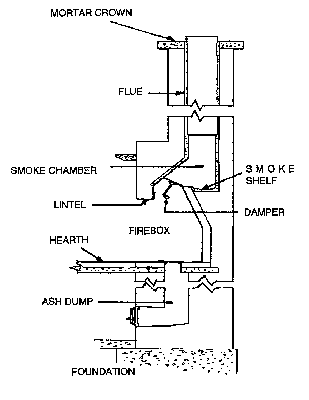Frequently Asked Questions
Can't find an answer to your questions below? Please contact us at the office!
jenn.ryanandsonchimneys@gmail.com or 973-398-3978
We look forward to hearing from you.
01
How often should I have my chimney cleaned?
Sweeping would be "as necessary", however, the NFPA 211 recommends annual inspection.
Heating or Hot Water Heater (oil or gas) chimneys should be cleaned and or internally inspected once a year.
02
What is the basic anatomy of my fireplace?
A fireplace consists of a firebox (where you have your fire), the throat (where the damper assembly typically is) the smoke chamber (the area between the firebox and where the flue starts) & the flue liner (this may be stainless, terra cotta or other materials capable of withstanding the by-products of combustion).

03
Do you have to have your heating chimney cleaned?
YES! Most heating companies only service the heating unit and the connector pipes, and SOMETIMES the base of the chimney. They do not address the flue. A sweep and inspection is typically a separate service from a chimney company.
04
What kind of wood should I burn?
Dry, seasoned wood that has been cut down, split, and properly stacked for about a year. Don't forget to keep your wood ELEVATED off the ground and COVERED to avoid moisture!
05
My fireplace is smoking... Is that normal?
A fireplace smoking into the home is a sign of a functionality problem. Unbalanced house pressure, improper sizing, obstructions within the system, and more, can be one or multiple issues. A smoking fireplace is a hazard and potential danger and should not be used. A Level 2 inspection can help determine the cause and also allow us to provide you with a recommendation to repair your system.
06
Why do I have rust running down the side of my chimney/chase?
Rust is normally seen when the top components of the chimney (cap or chase cover) are made of aluminum and not stainless steel materials.
07
Can I change my one sided fireplace to a double sided fireplace?
Usually and most likely, no.
Commonly the biggest reason would come down to inadequate flue sizing, but other needed components within the system would be absent, such as a proper hearth, hearth extension protection, and masonry thickness.


